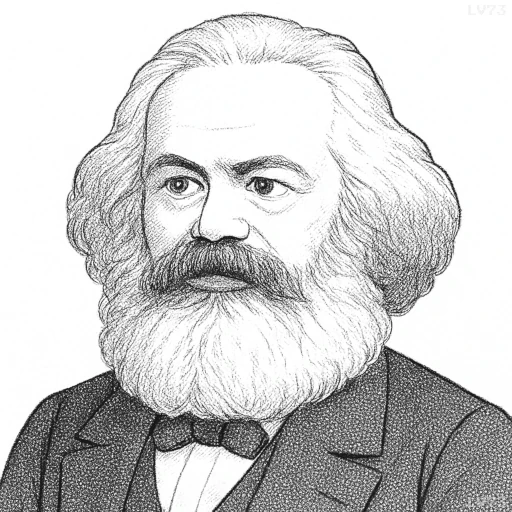“We should not say that one man’s hour is worth another man’s hour, but rather that one man during an hour is worth just as much as another man during an hour. Time is everything, man is nothing: he is at the most time’s carcass.”

- May 5, 1818 – March 14, 1883
- Born in the Kingdom of Prussia (Germany)
- Philosopher, economist, political thinker
table of contents
Quote
“We should not say that one man’s hour is worth another man’s hour, but rather that one man during an hour is worth just as much as another man during an hour. Time is everything, man is nothing: he is at the most time’s carcass.”
Explanation
In this quote, Marx critiques the capitalist notion of value based on labor time, which assumes that all hours of labor are equivalent in value. He argues against the idea that one person’s time (or labor) can be measured in the same way as another’s, as though they have the same intrinsic worth. Instead, Marx emphasizes that each individual’s labor is shaped by the context in which it occurs—social, economic, and historical conditions determine its true value. The phrase “man is nothing: he is at the most time’s carcass” points to the dehumanization of labor under capitalism, where workers are reduced to mere units of time that are extracted for profit, rather than being seen as autonomous individuals with their own agency or purpose.
Historically, Marx’s argument challenges the idea that capitalist labor markets equate labor hours as interchangeable, treating workers as commodities to be bought and sold in the marketplace. Under capitalism, workers sell their labor power, and the value of their work is often determined by the time they spend producing goods or services, not the quality, creativity, or humanity of their contributions. Marx believed that this focus on time reduces workers to the status of mere tools, alienated from the product of their labor and from each other, as they are only valued for the amount of time they spend producing. In contrast, human potential and individual worth cannot be fully captured by time or efficiency, and workers should not be seen solely as the “carcass” of time but as active participants in creating and shaping value.
In the modern world, this critique remains relevant in discussions about workplace exploitation, automation, and the gig economy. Many workers today are still seen as cogs in the machine, with their labor commodified and reduced to measurable hours rather than the human creativity and effort behind their work. The rise of precarious work, where workers are paid based on hourly rates or short-term contracts, can perpetuate this dehumanization. Marx’s critique invites us to reconsider how we value labor in modern society, calling for a shift away from purely time-based metrics to a more holistic view of human labor—one that acknowledges creativity, skill, and individual worth beyond just the time spent working.
Would you like to share your impressions or related stories about this quote in the comments section?
